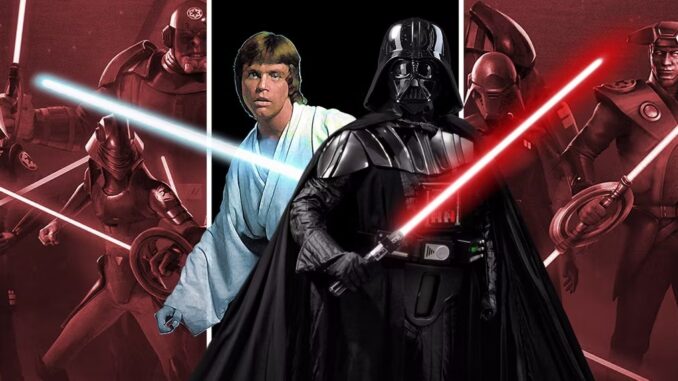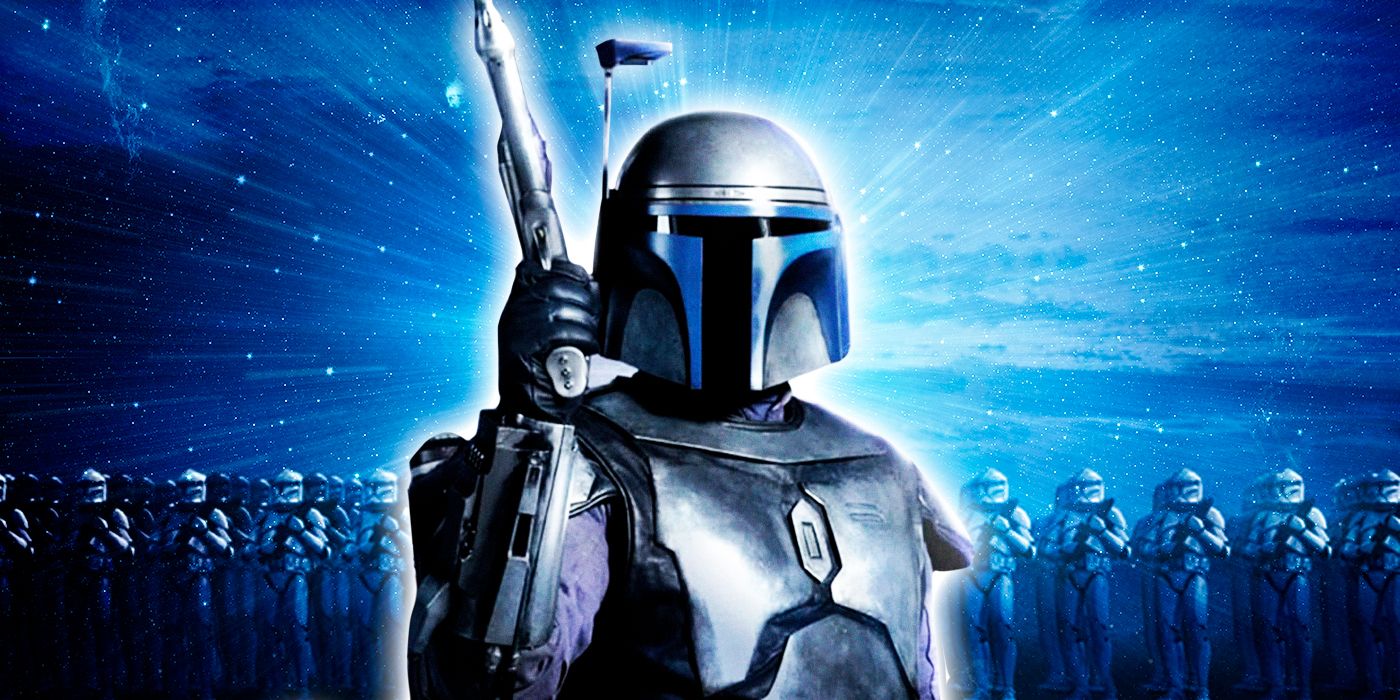
Why Inquisitors Dilute The Importance Of These Iconic Star Wars Characters
Disney’s heavy use of Inquisitors have inadvertently decreased the importance of several iconic Star Wars characters in the Skywalker Saga.

The world of George Lucas’ Star Wars has enthralled audiences the world over since it debuted in 1977. The Original Trilogy in Lucas’ vision began the Skywalker Saga, the story of Luke Skywalker leaving behind the simple life of a farm boy and joining the Rebel Alliance against his father, Darth Vader. However, Disney’s creation of the Inquisitors, Imperial enforcers with the power of the Dark Side, has watered down the significance of the story of Luke and Anakin.
The stories of the Star Wars universe have been told across numerous eras, but the Original Trilogy era remains the most essential to the story of Skywalker. Based around Luke’s training to become a full-fledged Jedi knight, so he could face Vader, it was made clear that the galaxy had been all but rid of Jedi. Beyond Obi Wan and Yoda living in their exile, only Luke was able to step up and restore balance to the Force. However, the recent era of the franchise has seen the wide proliferation of force users during this era, and nowhere has this been more evident than in the Inquisitors. These agents of the Dark Side were dispatched around the galaxy to hunt down old Jedi and enforce the Emperor’s will. However, their use in the franchise, coupled with their pasts, has left the original three films and the story of Luke feeling less special than ever.
The Desolation Of The Force In The Original Trilogy
Obi-Wan Kenobi staring into the middle distance in Star Wars: A New Hope
Disney Nerfed These Iconic Star Wars Weapons
In the Original Trilogy, George Lucas went to great lengths to make it clear to his fans that the Force was all but extinct in the aftermath of the fall of the Republic. Nowhere was this clearer than in the scene in which Admiral Motti ridiculed Vader’s faith in the Force, as if it were some bygone religion that had no significance. Likewise, the grounded space-faring smuggler Han Solo took an entire film to be convinced the Force even existed at all beyond fairytales and superstition. In hindsight, it’s clear that, as far as George Lucas was concerned, the Force only lived on through a handful of characters, namely those featured in the trilogy. Counting Yoda, Luke, Obi-Wan, Vader and Palpatine, the force users left in the galaxy could literally be counted on one hand. This stands in stark contrast to the vision of a post-Republic galaxy presented by Disney.
The idea of Luke’s unique place in the galaxy was cemented through Obi-Wan’s reference to him as “our only hope.” While Leia was referenced as another possible hero thanks to also being Anakin’s child, it was Luke’s journey and confrontation with Vader that represented the fight between the light and dark. It was through the incredible final duel between father and son that the fate of the balance of the Force was decided, with Palpatine’s attack swaying Anakin back to the light. However, in the Disney universe, where it was revealed that the Empire commanded a small army of Dark Side users, the whole notion of balance is completely thrown by the wayside. Now, the defeat of Vader carries much less weight, and even less since it was revealed that Palpatine had somehow survived his original death.
The proliferation of Force users, both light and dark, has been met with very mixed responses from fans. On one hand, some fans say this makes complete sense, and point to Lucas’ own revised explanation for the force through midi-chlorians as a reason why it would be this way. However, another faction of the fandom was never in love with this idea to begin with, and preferred the idea that the Jedi could very well have gone extinct had Luke lost to Vader. This, coupled with Luke and Vader each representing the last of their respective sides of the Force, made the final battle between father and son all the more poignant. In Luke, Obi-Wan and Yoda had entrusted the future of the Jedi — and it paid off. Their duel signified the long-awaited fulfillment of the Jedi prophecy of the Chosen One, one that restored light to the galaxy decades after it had been extinguished.
The Inquisitors Raised A Lot Of Questions
One of the issues with the rise of the Inquisitors is that it waters down the idea that the Force had become the rarity that it originally was. With these Dark Side enforcers used by the Empire to solve just about every major threat, the idea that they and their powers would have gone unnoticed is hard to believe. The galaxy is a big place, but the Inquisitors have never been shown to be particularly subtle. In fact, various of their members have been shown to relish in the terror they inflict upon people. It has been revealed that these Inquisitors all began as young Jedi, and were forcefully converted into villains after Order 66. However, this leaves fans with questions, such as why the Emperor’s Order 66 extended to younglings at all, if they were so easily swayed to the Dark Side. It also leaves open the question as to why fans never saw these villains whatsoever in the original movies.
One of the aspects of post-Republic Star Wars lore that fans loved, especially through the comics, was Vader hunting down escaped Jedi himself. This made for some fantastic moments during the many comic book runs dedicated to this era, which saw some interesting interplay between the Sith Lord and his old brethren. However, now that this has been effectively retconned as having been the role of Inquisitors, with Vader only stepping in when needed, the villain’s activities in this era seem less interesting. It’s not even clear whether he’d have joined the hunt during the Obi-Wan Kenobi series if he had no connection to the Jedi. The idea of Vader ruthlessly pursuing these Jedi in his weakened, robotic state helped build him up as a true threat despite his injuries, which all added great context to the Original Trilogy.
In defense of the inclusion of characters like Kanan, Ezra and Ahsoka, it was made clear that the Empire wanted to suppress all mention of these Jedi during Palpatine’s rule. After all, he had succeeded in reducing the Jedi to little more than a faded memory in the minds of people across the galaxy. It makes sense that their presence would have been kept secret during the Original Trilogy, even if that also raises problems with the stakes. However, when it comes to the Inquisitors, this anonymity simply doesn’t make sense, and it’s hard to explain why none would have been deployed to the Death Star, Hoth or Endor. It makes even less sense that Imperial officers would be bold enough to mock Vader for having faith in the Force, especially since they’d surely be well aware of these Inquisitors and their abilities.
Luke And Vader Represented Balance
An Unlikely Star Wars Character Knew About Luke’s Connection To Darth Vader
One of the themes present throughout George Lucas’ reign over Star Wars was always the idea of bringing balance to the Force. With the ending of Return of the Jedi in mind, some have interpreted this prophecy differently. For some, it was the death of the Sith that signaled the restoration of balance, while others like the idea of Luke becoming a grey Jedi, neither wholly light nor dark, as a symbol for the balance. Regardless, the recurring theme is clear: The balance of the force was very much down to Luke, Vader and Palpatine. When Yoda and Obi-Wan died, there was a palpable sense that the last guardians of the Force had perished, and the fate of the galaxy rested with Luke. This was affirmed after his victory when the ghosts of Anakin, Obi-Wan and Yoda appeared at the end of Return of the Jedi.
The presence of additional force users in the galaxy had always been debated among fans. However, it was generally agreed that even if other Jedi and dark side users existed, they had passed into anonymity for their own safety from the Empire. After all, the point of Palpatine’s plan was to usher in a new era of rule of the Sith, but to do so anonymously to preserve his control. Given everything that’s known about the Sith, it makes little sense for the Empire to turn to them to carry out their will. Even worse is that the epic, final duel between father and son to decide the fate of the force in the galaxy starts to matter considerably less when framed in the wider context of Inquisitors and rogue Jedi.